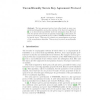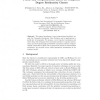5 search results - page 1 / 1 » Multisignatures secure under the discrete logarithm assumpti... |
CCS
2008
ACM
13 years 9 months ago
2008
ACM
Multisignatures allow n signers to produce a short joint signature on a single message. Multisignatures were achieved in the plain model with a non-interactive protocol in groups ...
CCS
2006
ACM
13 years 11 months ago
2006
ACM
A multi-signature scheme enables a group of signers to produce a compact, joint signature on a common document, and has many potential uses. However, existing schemes impose key s...
CN
2006
13 years 7 months ago
2006
In certain reliable group-oriented and multicast applications, a source needs to securely verify whether all (and if not all, which) intended receivers have received a message. How...
IMA
2001
Springer
13 years 12 months ago
2001
Springer
Abstract. The key agreement protocol are either based on some computational infeasability, such as the calculus of the discrete logarithm in [1], or on theoretical impossibility un...
EUROCRYPT
1999
Springer
13 years 11 months ago
1999
Springer
Abstract. This paper investigates a novel computational problem, namely the Composite Residuosity Class Problem, and its applications to public-key cryptography. We propose a new t...


